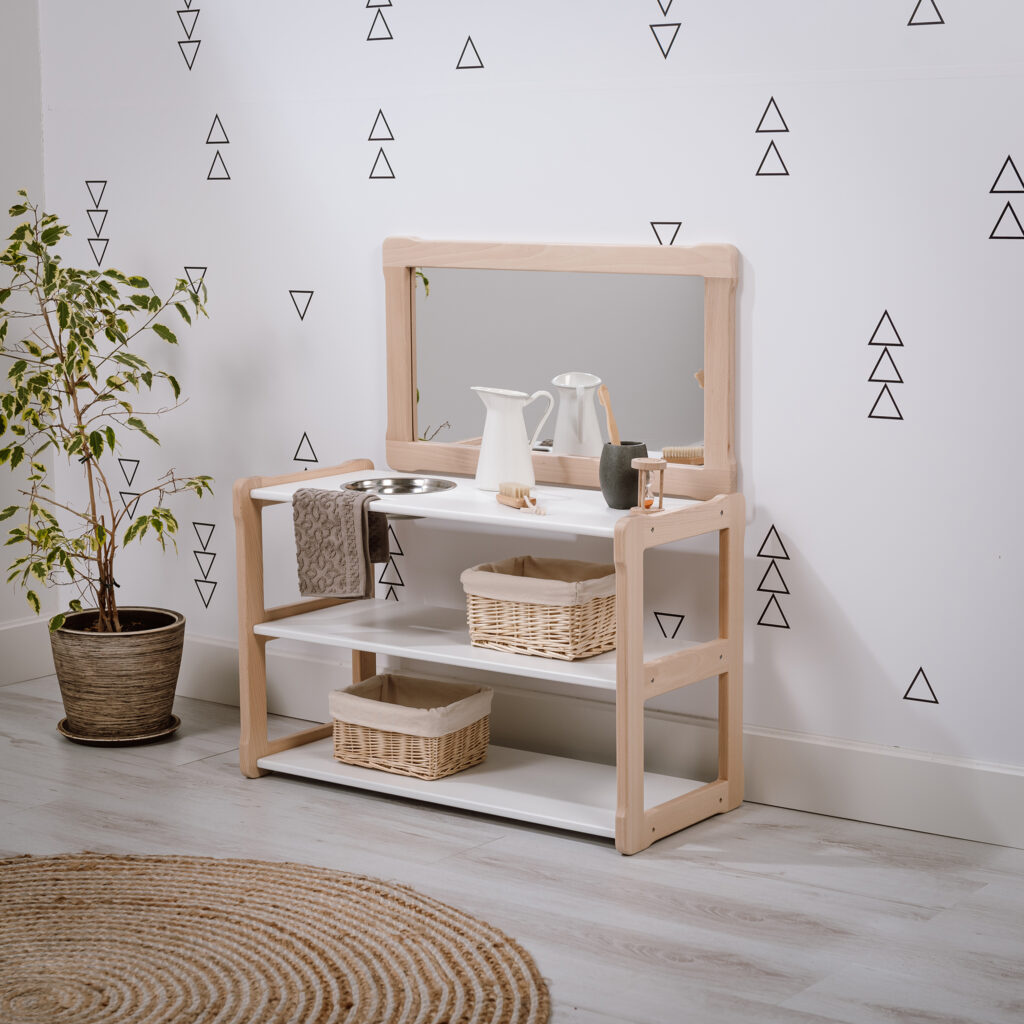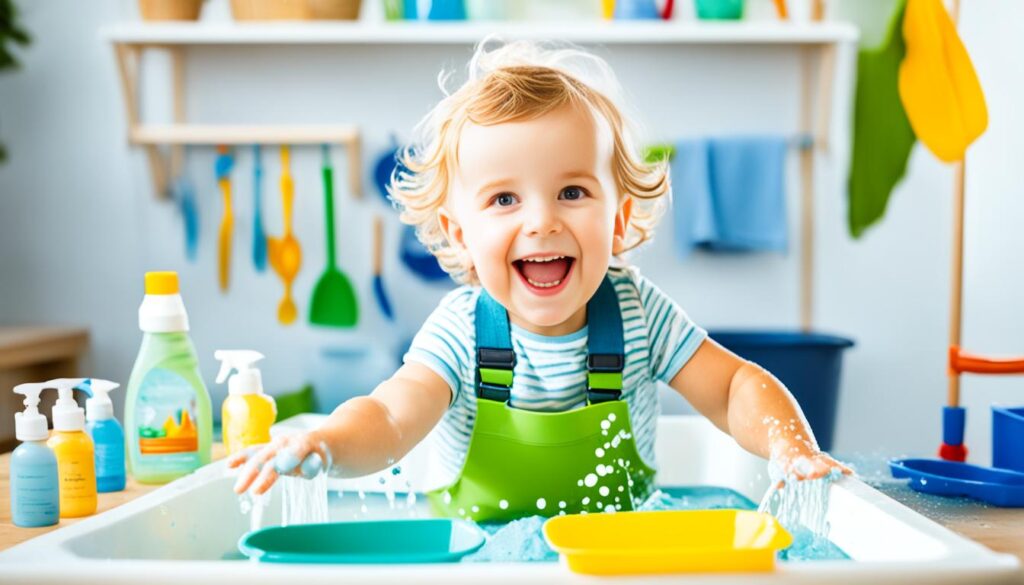Are you looking for a way to nurture your child’s independence and practical life skills? Look no further than a Montessori washing station. This innovative tool not only empowers young children to take charge of everyday tasks but also promotes early childhood education and fine motor skills development.
In a world where independence is valued, it’s essential to provide opportunities for children to develop their abilities to do things “all by myself.” A Montessori washing station offers a dedicated space for practical life skills, such as washing dishes, where children can take ownership of a task and gain confidence in their capabilities.
But how exactly does a Montessori washing station encourage independence and foster practical life skills? Join us as we delve into the benefits of this remarkable tool and discover how it can positively impact your child’s development.

Unveiling the Montessori Washing Station
The Montessori approach to education emphasizes the importance of practical life skills in a child’s development. These skills not only teach children how to perform everyday tasks but also promote independence and self-reliance. One key practical life skill that plays a significant role in fostering child independence is dishwashing. This section will provide a detailed explanation of the Montessori approach to practical life skills, highlighting the benefits of dishwashing in nurturing child independence. Additionally, we will explore the components of a Montessori washing station, including the tools and materials needed to create a child-friendly environment.
Defining the Montessori Approach to Practical Life Skills
The Montessori approach views practical life skills as essential components of a child’s education. Practical life skills encompass a wide range of activities that are meaningful and purposeful in daily life. By engaging in tasks such as dishwashing, children develop important skills like concentration, coordination, and independence. Through these activities, they learn to take responsibility for themselves and their environment, fostering a sense of competence and self-confidence.
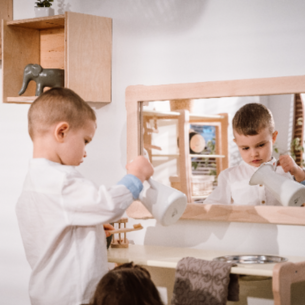
The Role of Dishwashing in Fostering Child Independence
Dishwashing is an activity that naturally appeals to young children’s desire for independence. By involving children in dishwashing tasks, they learn important skills such as following sequences, paying attention to detail, and practicing patience. Through their active participation, children develop a sense of pride and accomplishment, building their self-esteem and confidence. Dishwashing also provides opportunities for children to contribute to the family or classroom community, fostering a sense of responsibility and a positive work ethic.
Understanding the Components of a Montessori Washing Station
A Montessori washing station comprises several components that create a child-friendly environment for dishwashing. These components include:
- A low, sturdy table or counter: The table or counter should be at an appropriate height for the child to comfortably reach the sink or basin.
- A sink or basin: A child-sized sink or basin allows the child to independently access water for washing and rinsing.
- Dishwashing tools: Child-sized dishwashing tools, such as a sponge, scrub brush, and dishcloth, enable the child to manipulate and use the tools with ease.
- Safe and eco-friendly dishwashing soap: Choose soap that is safe for children and the environment, ensuring that it does not contain harsh chemicals or toxins.
- A drying rack: A designated space for the child to place washed dishes and utensils to dry promotes organization and completion of the task.
The image above showcases a child using a Montessori washing station, highlighting the key components mentioned. Creating a well-equipped and child-friendly washing station provides children with the tools they need to succeed in their dishwashing tasks and fosters a sense of capability and independence.
Setting Up Your Child’s Montessori Washing Station
Setting up a Montessori washing station for your child is an exciting endeavor that will foster independence and the development of practical life skills. By creating a child-friendly environment, you can provide the perfect setting for your child to learn and grow.
Here are step-by-step instructions on how to set up your child’s washing station:
- Select the appropriate space: Choose a location in your home where your child can easily access the washing station. Consider a spot near the kitchen sink or in the bathroom that is easily reachable for your child.
- Organize the necessary tools and materials: Gather child-sized dishwashing tools, such as a small basin, sponge, soap pump, and a drying rack. Ensure that the tools are safe and suitable for your child’s age and abilities.
- Ensure safety and accessibility: Make sure the washing station is set up in a safe manner. Keep breakable items out of reach and ensure that the station is at an appropriate height for your child. Consider using a non-slip mat under the basin to prevent accidents.
- Create a visually appealing environment: Make the washing station inviting for your child by adding colorful decorations or decals. Consider including pictures or illustrations of different dishware to facilitate learning and make the station visually engaging.
Remember, the aim is to create a child-friendly environment that encourages independence and promotes the development of practical life skills. By following these steps, you can create an inviting and functional Montessori washing station for your child.
Benefits of a Montessori Washing Station in Early Childhood Education
A Montessori washing station offers numerous benefits in early childhood education. It enhances a child’s concentration and attention span as they engage in the task of dishwashing, which requires focus and precision. Additionally, the act of completing a task independently and seeing the results can cultivate a sense of accomplishment and enjoyment in young children.
When children interact with a Montessori washing station, they develop important skills that contribute to their overall educational development. The concentration and attention span required during dishwashing help children improve their ability to stay focused on a task, a skill that is invaluable in all areas of learning.
Dishwashing also provides a sense of accomplishment for children as they take ownership of the task and see the results of their hard work. This sense of achievement boosts their self-esteem and instills a sense of pride in their abilities.
Furthermore, engaging in the task of dishwashing can be enjoyable for young children. They can experience the satisfaction of completing a task and contributing to their environment in a meaningful way. This enjoyment fosters a positive attitude towards learning and encourages children to embrace new challenges.
Engaging with a Montessori washing station not only promotes practical life skills but also enhances concentration, cultivates a sense of accomplishment, and fosters enjoyment in young children. This holistic approach to early childhood education lays a strong foundation for their future learning experiences.
A Montessori washing station provides a unique and beneficial learning experience for children. By incorporating practical life skills into their education, children develop essential life skills while also nurturing their joy of learning.
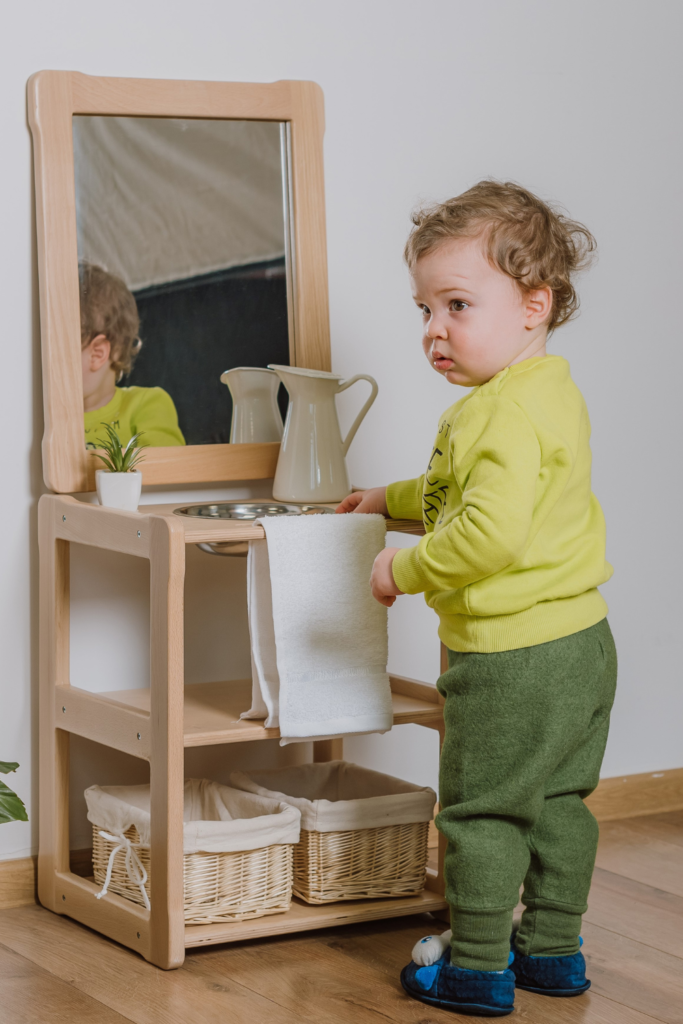
Selecting Age-Appropriate Tools for the Montessori Washing Station
When setting up a Montessori washing station, it’s crucial to select age-appropriate tools that allow children to comfortably engage in dishwashing tasks. Choosing the right tools will ensure a safe and effective learning environment for young children. Here are some tips on selecting the perfect tools for your Montessori washing station:
Customizing Sponges and Soap Pumps for Little Hands
Customizing sponges and soap pumps is essential to make them suitable for little hands. Look for sponges with smaller sizes and softer textures that children can easily grip and manipulate. Similarly, opt for soap pumps that are easy to press and control. By customizing these tools, children will feel confident and capable while engaging in dishwashing tasks, promoting independence and fine motor skill development.
Crafting a Child-Friendly Dishwashing Environment
Creating a child-friendly dishwashing environment is crucial for engaging and enjoyable experiences at the Montessori washing station. Consider the following tips:
- Use child-sized tables and chairs to ensure comfortable working heights.
- Place the washing station in a well-lit area with easy access to water and soap.
- Organize the tools and materials in a neat and visually appealing way to attract children’s interest.
- Use child-safe and non-toxic dishwashing products to ensure the safety and well-being of children.
Creating a child-friendly environment will enhance children’s engagement and enjoyment while promoting a positive association with dishwashing tasks.
Fostering a Connection Between Montessori Activities and Daily Routines
Creating a strong connection between Montessori activities, such as the washing station, and your child’s daily routines is key to reinforcing practical life skills and promoting independence. By seamlessly incorporating the washing station into daily activities, you can enhance your child’s ability to take ownership of everyday tasks, fostering a sense of empowerment and self-reliance.
Integrating the washing station into your child’s routine helps establish a sense of consistency and structure, allowing them to anticipate and engage in the task with enthusiasm. Designating specific times for dishwashing, such as before meal preparation or after snack time, creates a predictable pattern that your child can rely on.
“By linking the Montessori washing station with your child’s daily routines, you are creating an environment that supports their natural inclination for independence and self-sufficiency.” – Maria Montessori
By fostering this connection, you are providing your child with the opportunity to engage in practical life skills regularly, reinforcing their learning and allowing them to build upon their abilities over time. As they become more familiar with the washing station as part of their daily routine, they will gain confidence in their skills and develop a sense of accomplishment.
Encouraging your child to engage in the washing station at consistent intervals throughout the day promotes a deeper understanding of the task. They will begin to recognize it as an integral part of their daily life and understand the value and purpose behind their actions.
Remember to create a supportive environment that encourages your child’s participation in the washing station. Display their completed tasks proudly and celebrate their achievements. By showcasing their progress and highlighting their growth, you reinforce their connection between Montessori activities and their daily routines.
Next, we will explore how the Montessori washing station can be a gateway to learning through play and sensory exploration.
Montessori Washing Station: A Gateway to Learning Through Play
A Montessori washing station can be more than just a place to wash dishes. It can serve as a gateway to learning through play, providing children with opportunities for sensory exploration and hands-on engagement. By integrating sensory experiences with washing tasks, children can engage multiple senses and deepen their understanding of the task at hand.
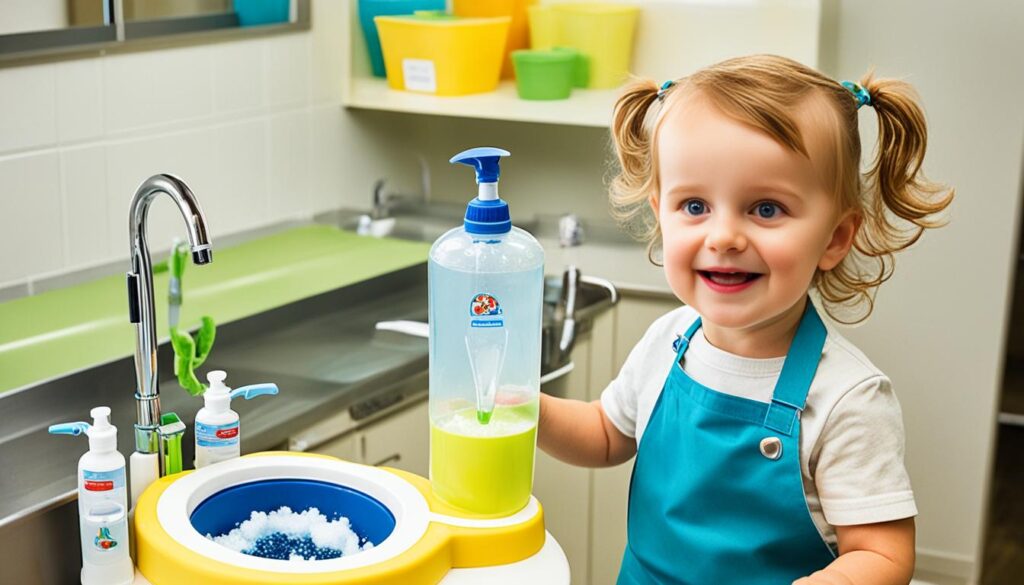
Integrating Sensory Exploration with Washing Tasks
One of the key benefits of a Montessori washing station is its ability to encourage sensory exploration. As children engage in dishwashing, they can immerse themselves in the tactile sensations of water, soap, and different textures. The act of scrubbing dishes can provide a unique sensory experience, stimulating their sense of touch and promoting sensory development.
By incorporating sensory materials such as textured sponges or scented soaps, children can enhance their sensory exploration further. They can feel the different textures on their hands, notice changes in water temperature, and even discover new scents. This integration of sensory exploration with washing tasks adds a dynamic element to the activity, making it more engaging and enjoyable for the child.
Connecting Montessori Objectives to Hands-On Dishwashing Fun
The Montessori approach aims to foster curiosity, problem-solving skills, and creativity in children. A Montessori washing station aligns with these objectives by providing hands-on dishwashing fun. As children engage in the task of washing dishes, they are developing and refining various skills that are essential for their overall growth and development.
Through dishwashing, children can enhance their fine motor skills as they manipulate objects and develop hand-eye coordination. They also learn important concepts such as cause and effect by observing how their actions directly impact the cleanliness of the dishes. The practical nature of dishwashing allows children to take responsibility for their actions and see the outcomes of their efforts, promoting a sense of accomplishment and self-confidence.
In addition, dishwashing can serve as an opportunity for problem-solving. Children encounter different types of dishes and utensils that require different cleaning methods, which encourages them to find innovative solutions and adapt their techniques. This process of trial and error fosters critical thinking skills and creative problem-solving abilities.
By connecting Montessori objectives to hands-on dishwashing fun, the washing station becomes a valuable tool for holistic learning and development in young children.
Adapting the Montessori Washing Station as Your Child Grows
As your child grows and develops, it’s important to adapt the Montessori washing station to meet their changing needs and interests. By scaling tasks and introducing new challenges, you can support their continued growth and reinforce the routine of the washing station.
Scaling Tasks for Developing Skills and Responsibilities
One of the key principles of the Montessori approach is to provide opportunities for children to develop their skills and take on increasing responsibilities. With the washing station, you can scale tasks to match your child’s developing abilities. Start with simple tasks, such as rinsing and drying dishes, and gradually introduce more complex and challenging tasks, such as washing delicate items or organizing the washing space.
By gradually increasing the difficulty of tasks, you allow your child to build their skills and confidence. This process of scaling tasks not only fosters their independence but also encourages them to take ownership of their responsibilities in maintaining the washing station.
Introducing New Challenges and Reinforcing Routine
In addition to scaling tasks, it’s important to introduce new challenges to keep your child engaged and motivated. This can involve introducing new techniques, such as proper scrubbing or handling different types of dishes. You can also encourage them to experiment with different cleaning agents or explore eco-friendly alternatives.
By introducing new challenges, you provide opportunities for your child to learn and grow in their dishwashing skills. It also helps to reinforce the routine of the washing station and maintain their interest and enthusiasm in this practical life activity.
Adapting the Montessori washing station as your child grows allows them to continue developing their skills and independence. By scaling tasks and introducing new challenges, you support their ongoing growth and foster a love for taking care of their environment. This adaptable approach to the washing station ensures that it remains a valuable tool in your child’s learning and development journey.
How to Encourage Independence with Your Montessori Washing Station
Encouraging independence with a Montessori washing station involves guiding your child through the dishwashing process while allowing them the freedom to take ownership of the task. By providing a supportive and empowering environment, you can help your child develop valuable life skills and a sense of achievement.
Guiding Your Child Through the Dishwashing Process
When guiding your child through the dishwashing process, it’s essential to offer gentle guidance and support. Here are some practical tips to help you guide your child effectively:
- Start with small, manageable tasks: Begin by assigning simple dishwashing tasks that your child can easily handle, such as rinsing plates or drying utensils. Gradually increase the complexity of the tasks as your child gains confidence.
- Provide clear instructions: Clearly explain each step of the dishwashing process to your child, breaking it down into smaller, manageable actions. Use simple and concise language that your child can understand.
- Show, don’t just tell: Demonstrate the dishwashing process to your child, allowing them to observe and learn from your actions. Encourage them to mimic your movements and gradually take on more responsibility.
- Encourage problem-solving: Instead of immediately providing solutions to challenges or mistakes, encourage your child to think critically and find their own solutions. This helps develop problem-solving skills and fosters independence.
Recognizing the Impact of “All by Myself” Moments on Child Happiness
When your child successfully completes a dishwashing task on their own, it can have a significant impact on their happiness and self-esteem. It’s essential to recognize and celebrate these “all by myself” moments. Here’s why they matter:
“All by myself” moments give children a sense of achievement and pride in their capabilities. By allowing them to take ownership of the dishwashing task and guiding them through the process, you’ll empower them with a deep sense of accomplishment and happiness.
These moments also contribute to your child’s overall development, building their self-confidence and fostering a positive attitude towards learning and independence.
When children are encouraged to take ownership of tasks like dishwashing, they experience the joy of independence. This image illustrates the happiness and self-esteem that can be fostered through “all by myself” moments. By guiding your child through the dishwashing process with a Montessori washing station, you can cultivate their independence and promote their overall happiness.
Conclusion
In conclusion, a Montessori washing station is a valuable tool in encouraging independence and developing practical life skills in young children. By providing a dedicated space for dishwashing and fostering a connection between Montessori activities and daily routines, you empower children to take ownership of everyday tasks and cultivate valuable life skills that will serve them well throughout their lives.
The benefits of a Montessori washing station extend beyond early childhood education. Engaging in dishwashing tasks promotes concentration, fine motor skills, and a sense of accomplishment. Through age-appropriate tools and a child-friendly environment, children can enjoy hands-on dishwashing fun while learning important lessons through play.
As children grow and develop, the Montessori washing station can be adapted to meet their changing needs. Scaling tasks, introducing new challenges, and reinforcing routine help children continue to develop their skills and independence. By encouraging independence with the washing station and guiding your child through the dishwashing process, you foster a strong sense of self-reliance, happiness, and pride in their accomplishments.
In conclusion, a Montessori washing station is a powerful tool in early childhood education that promotes independence, practical life skills, and a love of learning. Start your child’s journey towards independence and valuable life skills today with a Montessori washing station.
FAQ
What is the Montessori approach to practical life skills?
The Montessori approach emphasizes the importance of practical life skills in a child’s development. These skills, such as dishwashing, teach children how to perform everyday tasks and promote independence and self-reliance.
How does dishwashing foster child independence?
Dishwashing plays a role in fostering child independence by allowing them to take ownership of a task and develop their abilities to do things “all by myself.” It gives children the opportunity to complete a task independently and see the results, cultivating a sense of accomplishment and self-reliance.
What are the key components of a Montessori washing station?
The key components of a Montessori washing station include child-sized tools and materials, such as sponges and soap pumps, as well as a child-friendly environment that promotes engagement and independence.
How do I set up a Montessori washing station for my child?
To set up a Montessori washing station for your child, you need to select an appropriate space, organize the necessary tools and materials, and ensure the station is safe and accessible for your child. It is also important to make the washing station visually appealing and inviting for your child.
What are the benefits of a Montessori washing station in early childhood education?
A Montessori washing station enhances a child’s concentration and attention span, promotes a sense of accomplishment and enjoyment, and develops practical life skills. It also integrates sensory exploration and hands-on learning, fostering curiosity, problem-solving skills, and creativity.
How do I select age-appropriate tools for the Montessori washing station?
Age-appropriate tools for the Montessori washing station need to be customized to fit little hands. This includes selecting sponges and soap pumps that are easy for children to handle and manipulate. It is essential to create a child-friendly dishwashing environment that promotes engagement and enjoyment while ensuring the safety and well-being of the child.
How can I foster a connection between Montessori activities and daily routines with the washing station?
Integrating the washing station into a child’s daily routine reinforces practical life skills and promotes independence. By seamlessly incorporating the washing station into daily activities, you establish a sense of consistency and structure in a child’s routine, allowing them to take ownership of everyday tasks.
How does the Montessori washing station promote learning through play?
The Montessori washing station serves as a gateway to learning through play. By integrating sensory exploration with washing tasks, children engage multiple senses and deepen their understanding of the task at hand. The washing station connects to broader Montessori objectives, fostering curiosity, problem-solving skills, and creativity through hands-on dishwashing fun.
How can I adapt the Montessori washing station as my child grows?
As your child grows, the washing station can be adapted to meet their changing needs and interests. This includes scaling tasks to match their developing skills and responsibilities and introducing new challenges to foster continued growth and reinforce routine.
How do I encourage independence with a Montessori washing station?
Encouraging independence with a Montessori washing station involves guiding your child through the dishwashing process while allowing them the freedom to take ownership of the task. It is important to be patient, offer encouragement, and provide positive reinforcement. “All by myself” moments can have a significant impact on a child’s happiness and self-esteem.

